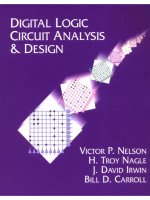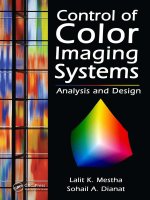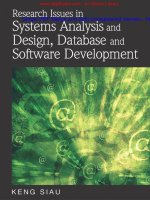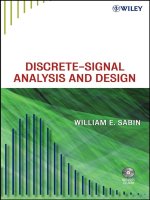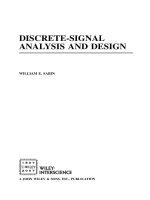DISCRETE-SIGNAL ANALYSIS AND DESIGN- P38 ppsx
Bạn đang xem bản rút gọn của tài liệu. Xem và tải ngay bản đầy đủ của tài liệu tại đây (113.63 KB, 5 trang )
INDEX
(k) harmonic numbers, 17
(n) time samples, 13
Adequate number of samples, 12
Adequate samples, 21
Adequate sampling, 16
Adjacent channel interference,
53
Adjacent frequencies, 47
AGC loop, 66
Aliasing, 3, 10
Aliasing, “classical”, 53
Aliasing and Þlter design, 53
Aliasing in the frequency domain,
48
Aliasing in time domain, 59
All-pass Þlter, 145–147
Analytic signal, 138
Approximation, 3
At-home productivity software, 7
Augmenting zeroes, 21
Autocorrelation, 10, 104
Autocovariance, 108
Averaging of data records, 13
Discrete-Signal Analysis and Design, By William E. Sabin
Copyright 2008 John Wiley & Sons, Inc.
Bandpass Þlter -60 dB response, 52
BASIC language, 6
Boltzmann’s constant, 118
C
++
,6
Circular smoothing, 65
Communications, 9
Complex conjugate phasors, 29
Complex frequency domain sequences, 22
Complex load impedance, 114
Computer aided design, 114
Continuous data vs discrete, 13
Convert MATLAB to Mathcad, 5
Convolution, 3, 10
Convolution, associative, 73
Convolution, circular, 85,122
Convolution, distributive, 73
Convolution “fold and slide”, 82
Convolution and multiplication, 89–93
Convolution smoothing and stretching, 82
Convolution sum, 85
Convolution, time domain, 81
Correlation, 3, 106
Correlation coefÞcient, 110
171
172 INDEX
Correlation, circular, 106, 122
Cosine wave, 32, 51
Covariance, 104
Cross-correlation, 10, 106
Cross power spectrum, 123
Cross-covariance, 110
Cumulative distribution function (CDF),
103
dB of aliasing, 53
dBm, 119
dc component in a sequence, 15
Deconvolution, 94
DFT, 2, 14
DFT and IDFT of discrete convolution, 89
Discrete data, 2
Discrete derivative, 153, 159
Discrete differential equation, 10
Discrete Fourier series, 9
Discrete-frequency, 2
Discrete-signal, 2
Discrete-signal amplitude, 12
Discrete-signal processing, 10
Discrete-time, 2
DSP, 2
Dummy variable, 103
Electronic engineering, 2, 9
Energy and power in a sequence, 12
Energy in a time sequence, 12
Ensemble average, 99
Envelope detection, 99
Equivalent circuit, 115
Estimate of noisy signal, 63
Eternal steady-state sequence, 9
Even symmetry, 30
Expected value (deterministic sequence),
96
Experimentally acquired values in
frequency domain, 12
Experimentally acquired values in time, 12
FFT and IFFT, 2, 16, 123
Filter method receiver, 150
Filter method SSB transmitter, 149
Flow chart, 161
Fortran, 6
Four point smoothing sequence, 61
Fractional values of frequency, 48
Frequency conversion, 52
Frequency conversion to baseband, 54
Frequency-domain, 1
Frequency-domain aliasing, example of,
55
Frequency-domain sequence, 1
Frequency doubler, 38
Frequency resolution, 19
Frequency scaling, 10, 19, 30, 48
Gain distribution, 52
Gaussian (normal) distribution, 102
Gaussian (normal) noise, 10
Gaussian “white” noise, 56
Hamming window, 123
Hanning window, 123
Help (F1), 5
Hilbert transform, 3, 10, 129–137
Hilbert transformer, 137–138
Histogram, 98
IDFT, 2, 18
Imaginary power (Vars), 116
Impulse response, 82
Initial conditions, 157
k/2 special frequency, 30
LabVIEW, 6
Laplace transform, 12
Long sequence windows, 75
Lowpass Þlter, 138, 147
Math literacy, 1
Mathcad, 4
Mathcad algorithms, 16
Mathcad Help (F1), 5
Mathcad “programming language”, 4
Mathcad Program (subroutine), 30
Mathcad student version, 5
Mathcad user guide, 5
Mathcad X-Y Trace tool, 41
MathType equation editor, 7
MATLAB, 5
Multiplication, 10
INDEX 173
Multiplication, polynomial, 78
Multiplication, sequence, 78
Narrowband noise analysis, 119
National Instruments Co., 6
Noise, additive, 97
Noise bandwidth, 119
Noise-contaminated spectrum, 3
Noise Þgure distribution, 52
Noise, random gaussian, 118
Noise ratio, 63
Noninteger x(n), X(k),35
Nonlinear ampliÞer, 35
Nonlinear effects in envelope detection,
119
Nyquist and Shannon requirements, 12
Odd symmetry, 30
One-sided sequence, 29
Open circuit generator voltage, 114
Pascal, 6
Peak and average power, 15
Peak hold in spectrum analyzer, 120
Pedestal window, 61
Personal computer, 2
Phase advance, 32
Phase conjugate and quadrature, 23
Phase delay, 32
Phase lag and advance in a sequence, 15
Phase modulation, 24
Phase noise, 125–129
Phasing method SSB receiver, 149
Phasor, 22, 24
Phasor even/odd combinations, 30
Phasor even symmetry, 51
Phasor odd symmetry, 51
Phasor polarity, 31
Phasor power, 114, 117
Phasor spectrum, 27
Planck’s energy constant, 119
Positive and negative frequency, 13, 15
Power, average, 99
Power cross spectrum, 10
Power in alias zone, 56
Power spectrum, 10, 113
Present, past, and future time, 13
Probability, 96
Probability distribution function (PDF),
102
Programming languages, 4
Pseudo-periodic sequence, 12
Pseudorandom data, 3
Quantum mechanical, 119
Ramp function spectrum, 39
Random data, 3
Randomness in a signal, 12
Random variable, 99
Real power (watts), 116
Real time samples and complex frequency
samples, 23
Record averaging, 101
Ronald Bracewell, 16
Scalar spectrum analyzer, 46
Scalloping effect, 46
Sequence structure, 10
Sequence time and phase shift, 86
Seven point smoothing sequence, 64
SigniÞcant and adequate signal energy, 14
Sine wave, 32, 51
Sine–cosine spectrum, 51
Sine–cosine –theta spectrum, 29
Single-sideband, 142–145
Smoothing, 3
Solving the difference equation,
159–162
Special k/2 frequency, 30
Spectral leakage, 3, 10, 43
Spectral leakage vs frequency offset,
49
Spectral overlap due to aliasing, 50
Spectrum errors, 44
Spectrum of a time sequence, 16
Square-law modulation, 35–37
SSB rf signal, 145
SSB transmitter, 148
Standard deviation, 101
State variable equation, 158
State variable solutions, 155
Statistical average of the square, 102
Statistical square of the average, 102
174 INDEX
Steady-state repetition of sequences,
14
Steady-state sequence, 3
Structured languages, 4
Superposition, 101
Symmetry, phasor, even, 116
Symmetry, phasor, odd, 116
Taylor series expansion, 16
Threshold effect, 119
Time average, 96
Time-domain, 2
Time-domain sequence, 9, 10
Time resolution, 20
Time scaling, 10, 19
Transient and steady states in sequences,
26
Transitional design, 66
Transition sampling, 66
Variance, 101
Vector spectrum analyzer, 47, 121
Wide sense stationary, 99
Wiener-Khintchine principle, 108,
121
Wiener-Khintchine theorem, 10, 124
Window, 6
Window aliasing, 75
Window Hamming, 68
Window Hanning(Hann), 68
Windowing, 3, 47, 67
Window Kaiser, 71
Window lobes, 68–75
Window rectangular, 68
Window widening at (k =0), 70
X(k) and its complex conjugate, 18
XCEL, 6
Technical Support
Contact PTC Technical Support if you encounter problems
using the software. Contact information for PTC Technical
Support is available on the PTC Customer Support Site:
/>You must have a Service Contract Number (SCN) to receive
technical support. If you do not have an SCN, contact PTC
using the instructions found in the PTC Customer Service
Guide under “Technical Support”:
/>guide




